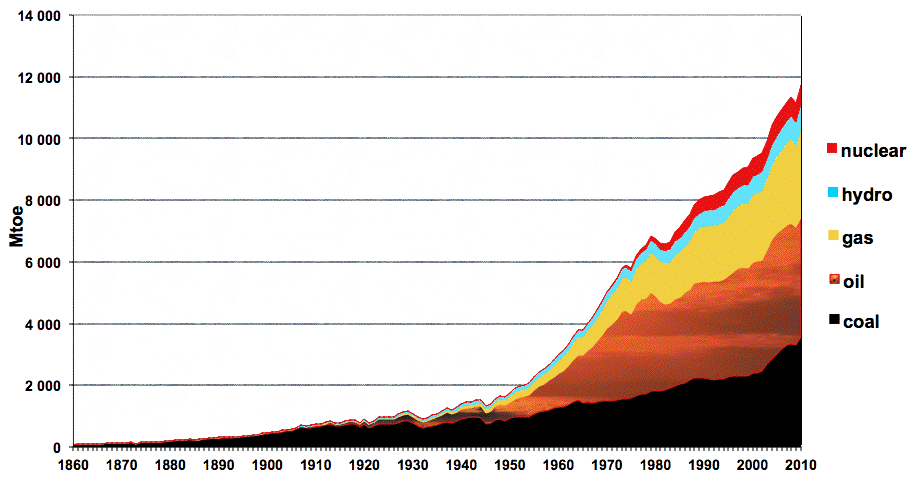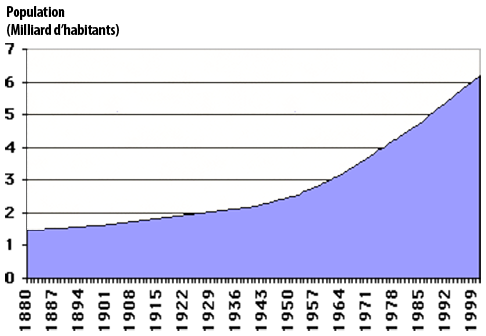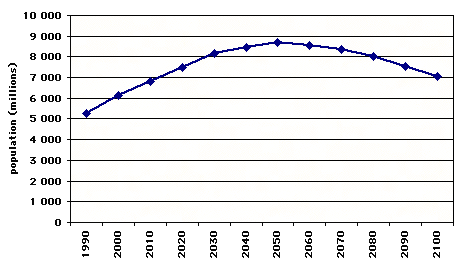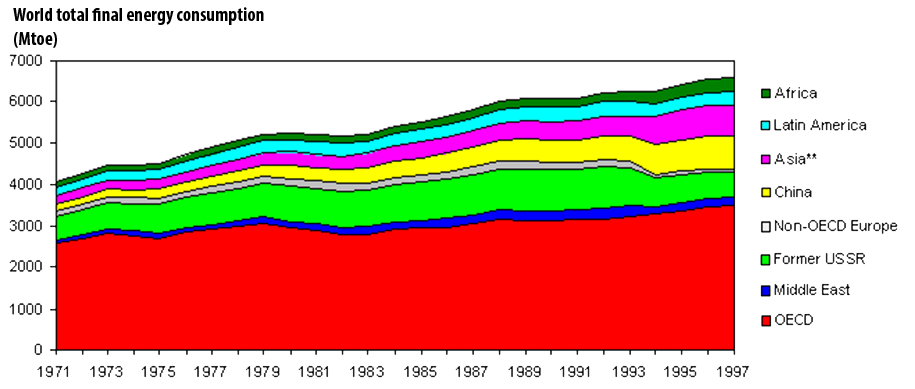Since 1860, which is simply the start date of the first statistics I managed to find, the world energy consumption has never stopped to rise steadily, more or less exponentially (below).

World commercial energy consumption (commercial means wood excepted, because most wood is not traded or sold but just picked up by the consumer), since 1860.
What a beautiful exponential curve! One easily observes that :
- neither the first World War, nor the Second one, nor the oil shock of 1974, nor the “Gulf War” has significantly affected a constant growth,
- our modern world is heavily dependant on fossil fuels (85% of the world energy consumption). Only countries that have a very important share of hydroelectricity or nuclear in their electricity production have a different contribution in their national energy mix)
- every “new” energy has not substitued the existing ones, but came on top : oil did not kill coal, but rather oil went on top of coal, the latter still rising.
Sources : Schilling & Al. 1977, International Energy Agency, Observatoire de l’Energie.
Almost all our CO2 emissions, and a fraction of the emissions of the other greenhouse gases come from energy use. Well, in a “business as usual” scenario (that is if we prolongate the trends), energy consumption should rise (but beware: a scenario is NOT a forecast):
- as a result of demographic growth to start with,

World population from 1880 to 2001, in billions.
Source : Musée de l’Homme (Paris)

An example of the evolution of the world population, up to 2100, in billions.
NB: there are of course many possible scenarios, and even an infinity ! For example, another scenario of the IPCC gives 15 billion human beings in 2100. Yet a scenario always corresponds to “soft” evolutions, hence there is no scenario foreseeing a rapid decrease of the human population during the coming decades as a result of a massive outbreak, or an all out war, though nobody can rule out such possibilities (but there is no mathematical function easy to handle that describes such eventualities, that’s all !).
A scenario is therefore nothing else than the consequence of a given set of hypothesis, more or less probable and more or less exhaustive, and nobody can say there is a “forecast”, impossible to establish as such.
Source : IPCC.
- and as a result of economic growth afterwards, as the correlation between energy consumption growth and economic growth is pretty strong in our current socio-economic system (what works both ways: a good recession is what is best to rapidely decrease our energy consumption !),

This zoom on recent years highlights the above mentionned correlation: a brutal contraction of the energy consumption in former USSR countries (light green) is clearly visible in the early 90’s, when these countries experienced a severe deconomic ecline. This evolution is also visible, albeit not as clearly, for the other former communist countries (non-OCDE Europe, in grey). The oil shocks (when the price of energy increases, in 1974, 1979 and 1990) just led to a stabilization of the consumption, but not to a significant decrease.
Source : International Energy Agency
- and, at last, as a result of the wish to increase the “standard of living”.
Why are we bound to increase our energy consumption in a “business as usual” case scenario ?
Because, in “developped” countries:
- We buy more and more manufactured goods, that require energy to be produced (it’s the famous “household consumption growth”, that everybody generally sees as (very) good news),
- We move more often and always farther, and consider this possibility as a non negociable right,
- We eat more and more meat (at last this increase seems to have stopped recently), and producing meat requires – surprinsingly – a lot of energy !
- In short the “economic growth” (the famous growth, that every politician and journalist deploring the state of the world still considers as excellent news) pushes towards an increase of the energy consumption, even with the so-called “dematerialization” of the economy.
And because, in the developping countries:
- People wish to drive cars, just as we do,
- they wish to take planes, just as we do,
- they wish to buy plenty of manufactured goods, just as we do,
- they wish to eat a lot of meat, just as we do (meat consumption in France has been multiplied by 5 between 1800 and 2000, going from 20 kg per person and per year to almost 100, and I am ready to bet part of my savings that a similar evolution happened in many other occidental countries),
- In short they aim at living like us, and particularly like Americans, that are the first energy consumers on the planet and also…the first audiovisual programme exporters, what enables to show how they live to the whole world.
There are of course many existing scenarios dealing with our future energy consumption, and the CO2 emissions that go along. Another page of this website describes the main characteristics of the IPCC scenarios that are used to feed climate models, and on another page still some reflexions of the scenarios of the “Club of Rome”.
I would like to conclude with an important remark: among the visible organizations that regularly publish some projections for the future (OECD, World Energy Council, United Nations, etc), none of them does take into account any explicit feedback whatsoever on the energy consumption, which means that the energy consumption, in these scenarios, is never bent by some negative consequence resulting precisely from an important energy consumption, as long as the supply can follow. For example, none of these scenarios – up to now – includes the possibilty that a significant consequence of climate change would disrupt so much human activities that, as a result, energy consomption would no longer be a growing function. The Club of Rome was one of the rare attemps to do so, but this kind of methodology does not seem to be widely spread.
To learn more
More data : International Energy Agency, World Energy Council